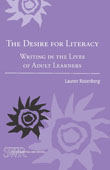This is the first of eight excerpts we will be offering from Lauren Rosenberg’s The Desire for Literacy: Writing in the Lives of Adult Learners, a volume in the CCCC Studies in Writing and Rhetoric Series. We’ll be offering a new excerpt each Monday. In this book, Dr. Rosenberg shares her interviews with four people who sought literacy as adults.
 Raised on a sharecropper’s farm in rural, pre–Civil Rights South Carolina, Chief began working alongside his father and other family members at a young age. His brother was married when Chief was about ten, and so, as the second oldest son, Chief took on the responsibilities of “plowing and mule[ing], and helping my father . . . cutting wood for the fire,” which prevented him from attending school regularly. They had two fields, a large field a distance from the house where the men and boys worked, and a closer field where the women and girls farmed in addition to maintaining the home. When Chief did go to school, it was usually on rainy days or in winter. Then he walked two to three miles each way. . . .
Raised on a sharecropper’s farm in rural, pre–Civil Rights South Carolina, Chief began working alongside his father and other family members at a young age. His brother was married when Chief was about ten, and so, as the second oldest son, Chief took on the responsibilities of “plowing and mule[ing], and helping my father . . . cutting wood for the fire,” which prevented him from attending school regularly. They had two fields, a large field a distance from the house where the men and boys worked, and a closer field where the women and girls farmed in addition to maintaining the home. When Chief did go to school, it was usually on rainy days or in winter. Then he walked two to three miles each way. . . .
Chief recalls:
I always wanted to read and write. I didn’t get the chance. . . . You always wanted to learn to read. Especially, if when you don’t grow up and you—, it helps you to better yourself in jobs, to speak better, and it helps you in a lot of ways. I love to read now; since I learned to read, I read all the time. And it’s opened up a new world for me.
During an interview, Chief and I discussed what being nonliterate was like:
It’s a, uh, a shyness from when you, ah, can’t read and write. . . . You set back and let a lot of other people do the talking because you don’t say too much. . . . Uh, you don’t want to say the wrong thing. Ah, you get some of the words, big words that are said you don’t understand. So you don’t want to say nothing that you don’t know what you’re talking about. . . . Opinions. . . They might not, uh, even if they don’t know you can’t read, you still be thinking: my opinion don’t mean nothing here.
Underneath the joy he expresses over reading and writing, Chief describes his frustration too. I take in his sense of conflict and regret when his voice becomes low and he looks down. He gets upset when he recalls the past and the losses he experienced, some because of nonliteracy and some because of the conditions of his life. When he articulates regret, his words rumble. I hear the “set[ting] back” he talks about as reticence mixed with sadness. But these words come from a man whose opinions do matter, who knows now (at least much of the time and after many years of uncertainty) that people do want to hear what he has to say. Now people will listen to him and acknowledge that he knows. Yet for most of his life, Chief has wrestled with his “shyness” and turned it in upon himself. Even when he knew what he thought and wanted to express, he still self-censored because of his anxiety about saying “the wrong thing” and appearing ignorant. The stigma he bore as someone who knew some of the words but might not understand the big words caused him repeatedly to doubt his own ability to contribute in conversations. Because he feared that others might judge his opinions as irrelevant, Chief was caught in a cycle of self-doubting and imagining that he was doubted, which rendered him essentially silent.
All eight of our excerpts from this book will be added here.
